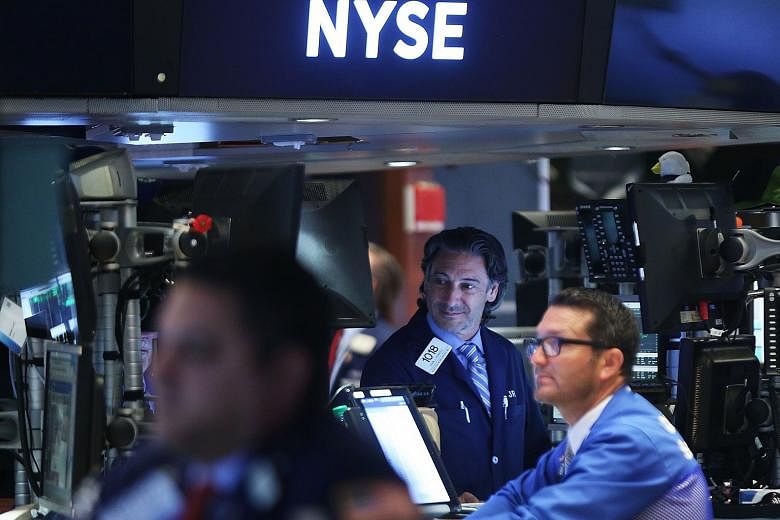SINGAPORE - Brexit was supposed to be a British decision and whichever path its voters took, the consequences should, in theory, fall fairly and squarely only on Britain alone.
Yet, in the aftermath of Britain's decision to leave the European Union (EU), there was widespread financial mayhem across the globe as the world's stock markets plummeted by as much as US$3 trillion in just two trading sessions.
Since then, there had been a technical rebound with badly bruised blue-chips regaining some of their poise on what traders would call "technical short-covering" - short-sellers making purchases to cover back positions which they had sold earlier at higher prices.
However, the improved mood is not likely to last, given the lingering uncertainties over the tough negotiations which Britain is expected to encounter with its European partners in negotiating its exit from the EU.
Markets abhor uncertainties and just like the drawn out several eurozone crises that were encountered over the past few years, investors are likely to face prolonged agony as the market reacts to each twist and turn in the Brexit negotiations.
Now, considering that so much money is at stake here, one question to be asked is how some of the world's finest investment minds could get it so badly wrong by making huge wagers that Britain would stay firmly within the EU and the disastrous closing of their positions which triggered a global sell-off.
As an outsider watching the Brexit campaign from faraway Singapore, I had come to the conclusion that there was a strong likelihood of British voters opting to leave the EU as xenophobic fears were stirred up over the flood of foreigners pouring into Britain and triggering anxiety over increased competition from everything from children's places in schools to beds in hospitals.
I had felt that the intellectual arguments put forward by the Remain camp over the negative impact to the British economy to be simply too high-browed to be grasped by a domestic British electorate with domestic concerns.
The Remainers also failed to take into account the resentment felt by huge swathes of the British electorate over the years of austerity which they have to put up with, after the global financial crisis, coping with stagnant wages and abnormally low interest rates environment which eroded their retirement savings in a big way.
Despite the polls suggesting that the referendum was too close to call, market speculators loaded up big-time on their bet that the British would stay in Europe.
As the Financial Times columnist John Authers observed, the speculators had fallen into a "narrative fallacy", believing a story that appealed and then choosing to perceive only the facts that fitted the story.
To many of these speculators, the turning point had been the ghastly murder of pro-Remain British MP Jo Cox which convinced them that voters would be so turned off that they would step back from leaving the EU.
And while bookies had reported that far more people were betting on Leave, markets were swayed by the fact that the bets on Remain were for far greater amounts, moving the odds in favour of a Remain victory.
That had turned out to be such a persuasive call that just after the voting closed on late Thursday, the British currency even topped US$1.50 for the first time this year, reflecting market confidence that Britain would vote to remain.
It was only after the results came flooding in - that vast tracts of the country had voted to leave - that traders realised something very bad had happened with their bets and scrambled to unwind their positions.
This was reflected in the manner in which the British pound skidded lower with the announcement of each result, last Thursday night (June 23), of voters turning their back on Europe.
What next? My gut feel is that the market turmoil is not over yet. Brexit is just the latest of the so-called "Black Swan" events to hit the market this year.
(For the uninitiated, a black swan event is a term coined by finance professor and best-selling author Nassim Taleb about an event which is not anticipated by the market and which is very difficult to predict.)
Just to jolt the memory of such other recent events, these included oil prices halving in a matter of weeks to a seven-year low of US$26 per barrel in January this year (2016), and the wobbles in the Shanghai stock market in the same month, following the installation of circuit-breakers which were ironically put there to prevent wild swings in stock prices in the first place.
And there may be more Black Swan events ahead: like the US presidential election where Senator Hillary Clinton, the candidate favoured by many on Wall Street, is finding it an uphill struggle to woo wavering voters to her cause.
The redeeming grace for now is that the summer Olympics is on the way and that, perhaps, may take some heat off the market as traders and investors turn to their TV sets to watch the competition among the world's best athletes in the sports arena.


